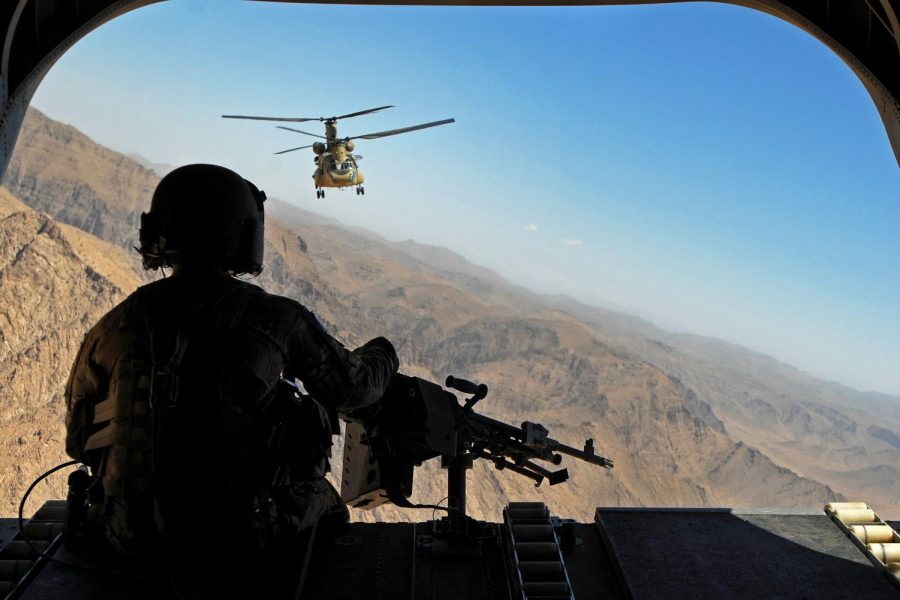Opinion | American solipsism hurts Afghans again
Photo Courtesy of U.S. Army/Sergeant Jessi Ann McCormick/Flickr
Sergeant Zach Smola, rear door gunner on a CH-47, keeps watch on the mountains in Uruzgan province, Afghanistan on May 12, 2013. Columnist Eddie Ryan argues that Americas self absorption has hurt Afghans yet again.
Sep 2, 2021
It strikes one as a morose and rather cruel instance of irony that the imagery which now bookends America’s stint in Afghanistan should feature planes and desperate, dying civilians.
Nearly 20 years ago, war was brought to American soil with innocent people used as ammunition; and now, the culmination of two decades in the country is marked by scenes of Afghans clamoring at Hamid Karzai International Airport, affixed to and, in some cases, plummeting from the sides of airborne aircraft.
The significance of the Taliban’s recrudescence lives in these images of crowds fleeing from tyranny at best and certain death at worst. While withdrawal had come to represent the prudent choice, an inevitable one to many who felt nothing constructive could be achieved anymore, the “how” and “when” of President Joe Biden’s move still merit reproach.
First, the decision taken was hasty, unscrupulous and a bit myopic. It prioritized symbolism and was made despite some intelligence that warned of how tenuous the Afghan security forces were. Most importantly, it conformed to the well-grooved, signature pattern of this war whereby American interests supersede Afghan voices.
The rhetoric surrounding the withdrawal was and remains laced with American solipsism.
Get The Daily Illini in your inbox!
Why end this “forever war?” Too many Americans killed and too many American resources wasted, comes the knee-jerk reply, with maybe a footnote for Afghan humanitarian concerns. Nevermind that the death toll runs much higher for the Afghan people who, incidentally, saw little of all that American aid after contractors and Afghan elites were done with it.
The point is not that American lives shouldn’t be mourned, for, of course, they should be.
Instead, the core problem lies in the narrative of this war, in which the needs and opinions of the Afghan people are relegated to afterthoughts. On the matter of actually listening to Afghans, Biden’s negligence matches that of his predecessors.
This notion raises a key distinction, namely the fault line over which left-wing internationalism slides into isolationism. One may have opposed the war from the start and presciently judged that corruption and arrogance would outweigh the humanitarian benefits to Afghans. But over 20 years, the landscape changed; solutions had to evolve beyond the easy clarity of early opposition. A precipitous exit suddenly ran the risk of grave irresponsibility.
What, one asks, could have been done then and should be done now according to Afghans? This is difficult to measure, of course, since polls are often meaningless. But the effort to listen is crucial.
One option could potentially have allowed the withdrawal to happen without simply leaving Afghans to wither under a depleted and misled Afghan government and a vengeful Taliban.
As Charli Carpenter of the University of Massachusetts Amherst wrote, a Bosnia-style humanitarian intervention could conceivably have helped. This would have involved a United Nations coalition of peacemakers conducting a politically neutral effort aimed principally at saving civilians.
Officials, ideally Muslims from countries like Indonesia whom the Taliban might regard with slightly less enmity, would treat them and Ashraf Ghani’s government as equal parties in negotiations to broker a power-sharing agreement. It would follow the Bosnian model of the mid-1990s to prevent a Srebrenica-like horror for Afghans while allowing the U.S. to move toward withdrawal.
If this sounds too naive or ambitious, the U.S. could at least have made a more concerted effort to listen to and work with Afghan peacemaking forces on the ground. A power-sharing agreement would have been better than the clearly foreseeable Taliban takeover which instead eventuated.
Perhaps it was surprising that Afghan troops whose salaries were pocketed by their commanders deserted, or that some Northern Alliance militia leaders put down their guns and defected knowing Americans would soon be gone.
Or maybe these obvious possibilities were ignored. In any case, plaintive refrains about the Afghan government’s failure to fight for its people despite being so well-equipped leaves out American complicity in the corruption of that government – a bit of a bogus blame game.
As for the present, the focus must be on Afghan refugees. The U.S. must evacuate all who wish to leave to fulfill a small part of the duty it incurred by invading – though even this effort has a ceiling with the Taliban blocking entry roads to the airport. A major expansion of Special Immigrant Visa provision is also in order.
A question which admittedly causes me some discomfiture also needs serious consideration. With the Taliban in power, is it really reasonable to withhold the money in Afghanistan’s reserves? To impose sanctions that will further immiserate long-suffering Afghan civilians? Unless such an approach miraculously yields a speedy Taliban capitulation, it seems grotesque to punish Afghans any more than their ruling theocrats already plan to do.
Though it may seem too late to put to use, the admonition is clear. Defer to Afghans on matters of their statehood and survival.
Eddie is a junior in LAS.






